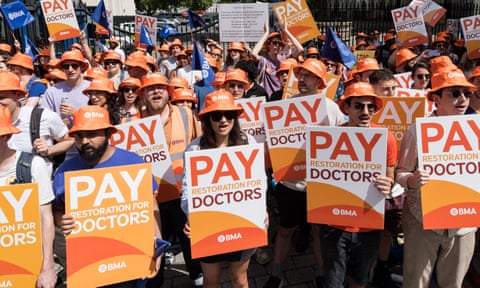Nurses decry ‘grotesque’ award that gives them 3.6%, as teachers express anger that part of increase will come out of school budget

About 2 million NHS staff and teachers in England will get pay rises slightly above inflation this year in a move that could trigger renewed public-sector strikes.
Doctors and teachers will receive an extra 4%, nurses and other health staff 3.6%, and resident (formerly junior) doctors 5.4%, ministers announced. Inflation was 3.5% last month.
Wes Streeting, the health secretary, and Bridget Phillipson, his education counterpart, both sought to promote the increases by highlighting that Labour has now given public sector workers rises above inflation twice in the 11 months since it won power last July.
Ministers will be watching closely to see how trade unions react to the sums offered, and if any reject the award and ballot their membership about strikes.
Nurses angrily denounced a “grotesque” award that gave doctors a bigger rise than them. Teaching unions and school leaders said that the government’s failure to fully fund the rise would inevitably force schools to cut spending on pupils.
Ministers accepted the recommendations of the independent pay review bodies, which advise them on the size of salary increses and have gone beyond the 2.8% they initially insisted was the affordable maximum.
Ministers are relying on schools and the NHS funding part of the settlements from their own resources through improved efficiency and productivity, which could involve painful decisions.
Prof Nicola Ranger, the leader of the Royal College of Nursing, said: “It is a grotesque decision to again favour doctor colleagues for higher increases than nursing and the rest of the NHS.”
She said last week that nurses could strike again – as they did in late 2022 and early 2023 – if this year’s pay offer did not help them address the 25% erosion in the value of their salaries since 2010.
Resident doctors in England decided earlier this month to hold a strike ballot even before the government disclosed its pay offer. The ballot, which opens next Tuesday, could give the British Medical Association a legal mandate to stage strikes for six months starting in July and resume the stoppages they undertook in 2023 and 2024.
Streeting said recently that resident doctors’ leaders were seeking a rise of 10% this year, on top of the 22% they received for 2023-24 and 2024-25, as part of their campaign to win “full pay restoration” – restoring the real-terms value of their pay by 2027 to what it was in 2008.
The British Dental Association also criticised the deal and said the 4% dentists had been offered was too little to “halt the exodus from NHS dentistry”.
Phillipson’s department earlier this year had recommended a pay award of 2.8%, in line with Treasury demands.
after newsletter promotion
Daniel Kebede, the general secretary of the National Education Union, said it was “testament to the strength of feeling in the profession” that the government had now offered an above-inflation increase. But, he added, leaving schools to part-fund the award was “a false economy” that could spell trouble later this year, including possible strikes.
Kebede said: “Unless the government commits to fully funding the pay rise then it is likely that the NEU will register a dispute with the government on the issue of funding, and campaign to ensure every parent understands the impact of a cut in the money available to schools, and that every politician understands this too.”
Pepe Di’Iasio, the general secretary of the Association of School and College Leaders, welcomed the 4% increase and the earlier timing of the announcement, but also criticised the failure to fund the award.
“If the government really thinks it will be possible to bridge this funding gap through ‘improved productivity and smarter spending’ then it is mistaken. Schools have already spent many years cutting costs to the bone and beyond,” Di’Iasio said.
Streeting said: “Despite the difficult financial situation the nation faces, we are backing our health workers with above-inflation pay rises for the second year in a row.
“This government was never going to be able to fully reverse a decade and a half of neglect in under a year. But this year’s pay increases – and last year’s – represent significant progress in making sure that NHS staff are properly recognised for the outstanding work they do.”



